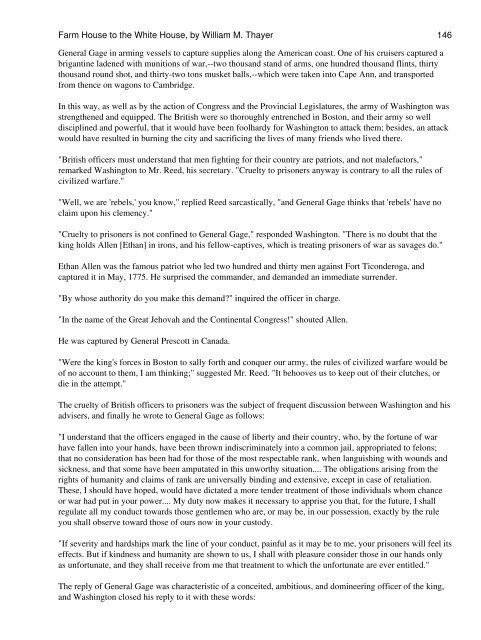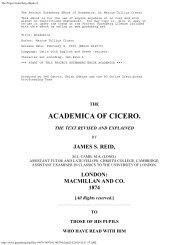From Farm House to the White House - 912 Freedom Library
From Farm House to the White House - 912 Freedom Library
From Farm House to the White House - 912 Freedom Library
Create successful ePaper yourself
Turn your PDF publications into a flip-book with our unique Google optimized e-Paper software.
<strong>Farm</strong> <strong>House</strong> <strong>to</strong> <strong>the</strong> <strong>White</strong> <strong>House</strong>, by William M. Thayer 146<br />
General Gage in arming vessels <strong>to</strong> capture supplies along <strong>the</strong> American coast. One of his cruisers captured a<br />
brigantine ladened with munitions of war,--two thousand stand of arms, one hundred thousand flints, thirty<br />
thousand round shot, and thirty-two <strong>to</strong>ns musket balls,--which were taken in<strong>to</strong> Cape Ann, and transported<br />
from <strong>the</strong>nce on wagons <strong>to</strong> Cambridge.<br />
In this way, as well as by <strong>the</strong> action of Congress and <strong>the</strong> Provincial Legislatures, <strong>the</strong> army of Washing<strong>to</strong>n was<br />
streng<strong>the</strong>ned and equipped. The British were so thoroughly entrenched in Bos<strong>to</strong>n, and <strong>the</strong>ir army so well<br />
disciplined and powerful, that it would have been foolhardy for Washing<strong>to</strong>n <strong>to</strong> attack <strong>the</strong>m; besides, an attack<br />
would have resulted in burning <strong>the</strong> city and sacrificing <strong>the</strong> lives of many friends who lived <strong>the</strong>re.<br />
"British officers must understand that men fighting for <strong>the</strong>ir country are patriots, and not malefac<strong>to</strong>rs,"<br />
remarked Washing<strong>to</strong>n <strong>to</strong> Mr. Reed, his secretary. "Cruelty <strong>to</strong> prisoners anyway is contrary <strong>to</strong> all <strong>the</strong> rules of<br />
civilized warfare."<br />
"Well, we are 'rebels,' you know," replied Reed sarcastically, "and General Gage thinks that 'rebels' have no<br />
claim upon his clemency."<br />
"Cruelty <strong>to</strong> prisoners is not confined <strong>to</strong> General Gage," responded Washing<strong>to</strong>n. "There is no doubt that <strong>the</strong><br />
king holds Allen [Ethan] in irons, and his fellow-captives, which is treating prisoners of war as savages do."<br />
Ethan Allen was <strong>the</strong> famous patriot who led two hundred and thirty men against Fort Ticonderoga, and<br />
captured it in May, 1775. He surprised <strong>the</strong> commander, and demanded an immediate surrender.<br />
"By whose authority do you make this demand?" inquired <strong>the</strong> officer in charge.<br />
"In <strong>the</strong> name of <strong>the</strong> Great Jehovah and <strong>the</strong> Continental Congress!" shouted Allen.<br />
He was captured by General Prescott in Canada.<br />
"Were <strong>the</strong> king's forces in Bos<strong>to</strong>n <strong>to</strong> sally forth and conquer our army, <strong>the</strong> rules of civilized warfare would be<br />
of no account <strong>to</strong> <strong>the</strong>m, I am thinking;" suggested Mr. Reed. "It behooves us <strong>to</strong> keep out of <strong>the</strong>ir clutches, or<br />
die in <strong>the</strong> attempt."<br />
The cruelty of British officers <strong>to</strong> prisoners was <strong>the</strong> subject of frequent discussion between Washing<strong>to</strong>n and his<br />
advisers, and finally he wrote <strong>to</strong> General Gage as follows:<br />
"I understand that <strong>the</strong> officers engaged in <strong>the</strong> cause of liberty and <strong>the</strong>ir country, who, by <strong>the</strong> fortune of war<br />
have fallen in<strong>to</strong> your hands, have been thrown indiscriminately in<strong>to</strong> a common jail, appropriated <strong>to</strong> felons;<br />
that no consideration has been had for those of <strong>the</strong> most respectable rank, when languishing with wounds and<br />
sickness, and that some have been amputated in this unworthy situation.... The obligations arising from <strong>the</strong><br />
rights of humanity and claims of rank are universally binding and extensive, except in case of retaliation.<br />
These, I should have hoped, would have dictated a more tender treatment of those individuals whom chance<br />
or war had put in your power.... My duty now makes it necessary <strong>to</strong> apprise you that, for <strong>the</strong> future, I shall<br />
regulate all my conduct <strong>to</strong>wards those gentlemen who are, or may be, in our possession, exactly by <strong>the</strong> rule<br />
you shall observe <strong>to</strong>ward those of ours now in your cus<strong>to</strong>dy.<br />
"If severity and hardships mark <strong>the</strong> line of your conduct, painful as it may be <strong>to</strong> me, your prisoners will feel its<br />
effects. But if kindness and humanity are shown <strong>to</strong> us, I shall with pleasure consider those in our hands only<br />
as unfortunate, and <strong>the</strong>y shall receive from me that treatment <strong>to</strong> which <strong>the</strong> unfortunate are ever entitled."<br />
The reply of General Gage was characteristic of a conceited, ambitious, and domineering officer of <strong>the</strong> king,<br />
and Washing<strong>to</strong>n closed his reply <strong>to</strong> it with <strong>the</strong>se words:















